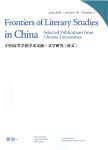The Conceptualization of Qing-Era (1644-1911) Chinese Literature in Nineteenth Century Choson (1392-1910) Korea
The Conceptualization of Qing-Era (1644-1911) Chinese Literature in Nineteenth Century Choson (1392-1910) Korea作者机构:School of Humanities and Languages The University of New South Wales Sydney NSW2052 Australia
出 版 物:《Frontiers of Literary Studies in China-Selected Publications from Chinese Universities》 (中国高等学校学术文摘·文学研究(英文版))
年 卷 期:2013年第7卷第3期
页 面:396-421页
学科分类:0501[文学-中国语言文学] 0303[法学-社会学] 0304[法学-民族学] 0502[文学-外国语言文学] 03[法学] 05[文学] 030401[法学-民族学] 050106[文学-中国现当代文学]
基 金:Academy of Korean Studies - Korean Government (MOE) [AKS-2011-AAA-2103]
主 题:Chong Yagyong Chinese literature in Choson Korea literarycommercialization Ming-Qing China Choson Korea
摘 要:In a poem composed in 1832, the Chosrn-Korean polymath Chrng Yagyong (1762-1836) declared his fidelity towards Confucian literary principles. Chrng's poem was a product of an elite education, and in both form and content, it embodied the ideals of the Chosrn elite: written in classical Chinese rather than Korean, it was an expression of cultural self-confidence. From the point of view of nationalism and its emphasis on vernaculars, it seems strange to define oneself through a cosmopolitan written language. But Chrng was no nationalist. He was a Confucian conservative, and the sense of distinction and difference that animated Chrng's poem was Confucian and literary. His articulation of such ideals manifested unease over the erosion of Confucian literary values in China and the prospect of the same occurring in Chos6n under Chinese influence. The source of that influence was books imported from China. What Chrng was reacting against was, at root, the commodification of literature and all that had entailed in Ming (1368-1644) and Qing (1644-1911) China. Although such concerns had grown increasingly urgent a half-century before, they had a long pedigree in Choson, stretching back to debates that had arisen in relation to Ming China and the principal emblem of the commodification of literature: commercial bookstores. This paper examines some of the principal differences between Chinese and Korean literary cultures that were embodied in Chang. It therefore begins with a brief overview of Chang and his poem, before turning to a discussion of some key sociopolitical and intellectual features that distinguished Chosrn's literary culture from that of China. Sixteenth-century attitudes towards bookstores are discussed to contextualize subsequent worries over Chinese books, with special attention given to the historical and historiographical dimensions of the question, before concluding with an assessment of the final moments of direct Chinese literary influence in Korea.



